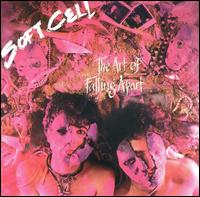The Art of Falling Apart is the second full-length album by the English synth-pop duo Soft Cell, released in 1983.
| The Art of Falling Apart | ||||
|---|---|---|---|---|
 | ||||
| Studio album by | ||||
| Released | January 1983 | |||
| Recorded | August–September 1982 | |||
| Genre | Synth-pop | |||
| Length | 40:00 | |||
| Label | Some Bizzare, Sire, Vertigo | |||
| Producer | Mike Thorne, Soft Cell | |||
| Soft Cell chronology | ||||
| ||||
| Singles from The Art of Falling Apart | ||||
| ||||
The album reached No. 5 on the UK charts, although its two singles "Where the Heart Is" and the double A-sided single "Numbers" / "Barriers" both failed to reach the Top 20, breaking the duo's run of five consecutive Top 5 singles in the UK, reaching No. 21 and No. 25, respectively. The album opener "Forever the Same" was initially planned as the 3rd UK single release, but withdrawn, with the original extended version of the track being included on 2018's career retrospective box set Keychains and Snowstorms: The Soft Cell Story.[1]
Initial copies of the album included a bonus 12-inch EP containing the tracks "Martin" and "Hendrix Medley".
Background
editThe song "Martin" was inspired by the 1978 horror film Martin directed by George A. Romero.[2]
The song "Numbers" refers to the banned 1967 novel Numbers by John Rechy.[3]
Reception
edit| Review scores | |
|---|---|
| Source | Rating |
| AllMusic | [4] |
| Robert Christgau | B−[5] |
In a joint review of The Art of Falling Apart and Berlin's Pleasure Victim, Michael Goldberg of Record remarked that while the opening tracks "Forever the Same" and "Where the Heart Is" are decent, Marc Almond's monotonal vocal style quickly wears thin, and David Ball's use of the same synthesizer stylistics on every track similarly "[makes] the whole album sound like variations on one theme." He particularly derided the synth-pop renditions of Jimi Hendrix songs, saying "Just that concept ought to elicit a chuckle. Suffice to say that Soft Cell are not able to do for the Hendrix songs what they did for Gloria Jones' 'Tainted Love'."[6]
The album was ranked at number 4 among the "Albums of the Year" for 1983 by NME.[7]
Track listing
editAll tracks written and composed by David Ball and Marc Almond, except where noted.
- "Forever the Same" – 5:06
- "Where the Heart Is" – 4:34
- "Numbers" – 4:55
- "Heat" – 6:11
- "Kitchen Sink Drama" – 3:56
- "Baby Doll" – 6:44
- "Loving You, Hating Me" – 4:18
- "The Art of Falling Apart" – 5:01
Extra tracks on remastered CD: SOME BIZZARE/MERCURY (558,266-2, June 1998)
- "Hendrix Medley" – 10:20 (Jimi Hendrix, Billy Roberts) [on bonus 12" with initial copies of the vinyl LP]
- "Martin" – 10:16 [on bonus 12" with initial copies of the vinyl LP]
- "Barriers" – 7:05 [double A-side of "Numbers" 7" and 12" singles]
- "It's a Mug's Game" – 8:15 [B-side of "Where the Heart Is" 12"]
Personnel
edit- Soft Cell
- Marc Almond – vocals, production
- David Ball – synthesizers, multi-instruments, backing vocals, production
- Additional personnel
- John Gatchell – trumpet, horns
- Mike Thorne – production
- Harvey Goldberg – engineering, mixing
- Don Weshba – engineering
References
edit- ^ "Announcing 'Keychains & Snowstorms – the Soft Cell Story' Boxset".
- ^ Making The Art of Falling Apart by Mike Thorne Archived 2 November 2009 at the Wayback Machine
- ^ LGBT Song of the Day – Soft Cell – Numbers 16 April 2017 edit/ incomplete note; Looking for why or when it may have been banned. Found nine published versions/ editions since original publication and right way through to recent years at www.goodreads.com/work/editions/105732-numbers but no actual dates or territories where it was banned.
- ^ AllMusic review
- ^ Robert Christgau review
- ^ Goldberg, Michael (June 1983). "The Art of Falling Apart/Pleasure Victim review". Record. 2 (8): 28–29.
- ^ "Albums and Tracks of the Year". NME. 2016. Retrieved 13 March 2018.